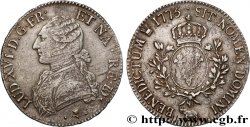fme_485374 - LOUIS XVI Médaille, Naissance du duc de Normandie (Louis XVII)
Not available.
Item sold on our e-shop (2020)
Price : 420.00 €
Item sold on our e-shop (2020)
Price : 420.00 €
Type : Médaille, Naissance du duc de Normandie (Louis XVII)
Date: 1785
Mint name / Town : 75 - Paris
Metal : silver
Diameter : 41,5 mm
Orientation dies : 12 h.
Engraver DUVIVIER Benjamin (1730-1819)
Weight : 33,14 g.
Edge : P.G. LABRIC. A. M.J. LEMOINE. LE 14 FEVRIER 1792
Rarity : R1
Coments on the condition:
Patine grise hétérogène. Présence de coups et rayures. Aspect regravé dans les champs tout autour des motifs
Catalogue references :
Predigree :
Cet exemplaire provient de la collection C. Terisse
Obverse
Obverse legend : LUD. XVI. REX - CHRISTIANISS.
Obverse description : Buste habillé de Louis XVI à droite ; au-dessous B. DU VIVIER.
Obverse translation : (Louis XVI, roi Très Chrétien).
Reverse
Reverse legend : NATALES LUDOVICI CAROLI DUCIS NEUSTRIÆ.
Reverse description : La France couronnée, assise à droite sous un palmier, inscrivant sur un table VOTA / PUBL ; sous un trait d'exergue XXVII MARTII / MDCCLXXXV et DUV..
Reverse translation : (Naissance de Louis-Charles, duc de Normandie).
Commentary
Cette médaille a été détournée en médaille de mariage, elle est aux noms des époux LABRIC et LEMOINE.
Le duc de Normandie, second fils du mariage de Louis XVI et de Marie-Antoinette naquit à Versailles le 27 mars 1785. Il devint dauphin après la mort de son frère aîné décédé le 4 juin 1789. Le 10 août 1792, il fut enfermé au Temple avec ses parents. Après la mort de son père guillotiné le 21 janvier 1793, les royalistes le proclamèrent roi titulaire de France sous le nom de Louis XVII. Le 3 juillet 1793 il fut séparé de sa mère, guillotinée le 16 octobre suivant, puis de sa tante Élisabeth qui fut également guillotinée le 10 mai 1794. Il fut confié à la garde du cordonnier Simon qui, contrairement à la légende, ne lui aurait personnellement fait subir aucun mauvais traitement (cf. Michel Mourre, Dictionnaire de l'histoire, p. 687). Le 5 janvier 1794, Louis XVII fut confié à la garde de quatre commissaires de la Commune. La date précise de son décès est incertaine ; il mourut probablement le 8 juin 1795 et il fut enterré secrètement au cimetière Sainte-Marguerite de Paris.
Le duc de Normandie, second fils du mariage de Louis XVI et de Marie-Antoinette naquit à Versailles le 27 mars 1785. Il devint dauphin après la mort de son frère aîné décédé le 4 juin 1789. Le 10 août 1792, il fut enfermé au Temple avec ses parents. Après la mort de son père guillotiné le 21 janvier 1793, les royalistes le proclamèrent roi titulaire de France sous le nom de Louis XVII. Le 3 juillet 1793 il fut séparé de sa mère, guillotinée le 16 octobre suivant, puis de sa tante Élisabeth qui fut également guillotinée le 10 mai 1794. Il fut confié à la garde du cordonnier Simon qui, contrairement à la légende, ne lui aurait personnellement fait subir aucun mauvais traitement (cf. Michel Mourre, Dictionnaire de l'histoire, p. 687). Le 5 janvier 1794, Louis XVII fut confié à la garde de quatre commissaires de la Commune. La date précise de son décès est incertaine ; il mourut probablement le 8 juin 1795 et il fut enterré secrètement au cimetière Sainte-Marguerite de Paris.








 Report a mistake
Report a mistake Print the page
Print the page Share my selection
Share my selection Ask a question
Ask a question Consign / sell
Consign / sell
 Full data
Full data



